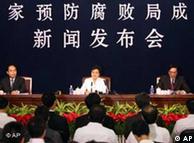In China, No Plans to Emulate West’s Way
BEIJING — China’s second-ranking Communist Party official issued a terse and complete disavowal of interest in Western-style democracy on Monday, saying that China would never adopt a multiparty political system, separation of powers, a bicameral legislature or an independent judiciary.
中国人大委员长吴邦国周一在11届人大2次会议全体会议上所作的报告中称,中国永远不会搞西方模式的民主。
The remarks by Wu Bangguo, the chairman of China’s parliament, established a hard line against political reform at a time when China’s leaders are notably worried about the possibility of public protests.
They also follow a public demand last December by more than 300 intellectuals and dissidents for China to abandon Communist rule and move toward a more democratic system.
Addressing the parliament, the National People’s Congress, Mr. Wu warned legislators that they should maintain “the correct political orientation” and that the party’s leadership would not tolerate being weakened.
“Although China’s state organs have different responsibilities, they all adhere to the line, principles and policies of the party,” he said.
Without a single Communist Party in control, Mr. Wu argued, a nation as large as China “would be torn by strife and incapable of accomplishing anything.”
His statements echoed those of other Chinese Communist leaders, who have frequently asserted that Western-style democracy is unsuited to China.
Mr. Wu’s remarks were especially tough, however, in that he not only ruled out adopting Western-style political institutions, but he also argued that China’s one-party system was superior to the democratic model.
China, he said, would never adopt a system of “multiple parties holding office in rotation,” or hold elections without government-chosen candidates on the ballot.
China has experimented in recent years with elections at low levels of government, permitting some villagers, for example, to choose among carefully chosen candidates for minor posts.
But the government has rejected moves toward free elections, even in nongovernmental bodies like the Chinese bar association.
Mr. Wu argued on Monday that China’s system of representation already gives a voice to even the smallest ethnic minorities.
In contrast, he said, the Western model of government guarantees representation only to candidates who are chosen by the majority.
He also appeared to dash hopes that China would liberalize along Western lines its legal system, which is closely tied to the Communist Party.
Rather, he said, China would establish “a legal system of socialism with Chinese characteristics” by 2010, allowing the Communist Party to establish legal doctrine instead of relying on Western-style court rulings to continually shape the law.
“The Western model of a legal system cannot be mechanically copied in establishing our own,” Mr. Wu told the legislators.
The National People’s Congress, whose 3,000 members meet annually to approve the government’s policies, has been holding a nine-day session in Beijing.
中国 | 2009.03.10
香港专家:坚持一党制难以杜绝腐败
中国人大委员长吴邦国在谈到中国人民代表大会制度的时候,特别强调了三点:第一,人民代表大会与西方议会有着本质区别;第二,人大和"一府两院"的关系也与西方国家议会、政府和法院的"三权鼎立"截然不同;第三,人大代表也与西方议会的议员不同。
香港城市大学的郑宇硕教授认为,吴邦国坚决反对"西方式民主"的表述,一方面可以说是对一段时间来国内外呼吁中国进行政治改革、实现民主的民意的一 种回应,但另一方面,凡是熟知中国政治运作的人都明白,中共领导高层没有任何放弃政治权力垄断的意思。他说:"现在所谈的政治改革,一方面是指行政层面的 改革,另一方面就是在党内部进行一些比较民主的改革。意思就是说权力还是留在党内。"
郑宇硕教授说,目前谈得比较多的还是在共产党的体制之内进行改革,比如党代表差额选举,要求党代会负更多的责任等等。但是,如同西方国家批评的那 样,中国的政治改革到目前为止还没有出现任何实质性的进展。也就是说,"一党专政"仍然是一个不可触及的"底线"。郑宇硕教授说:"基本上是没有什么突 破。从民主政治的角度来看,中国还是维持着共产党对权力的垄断。但是中共领导层也感受到了来自各个方面的压力,所以在维持党的权力垄断的基础上还是会提高 一些透明度,提高各级干部的责任感,以获得民众的好感和支持。基本上还是党不能放权,但是要把这个党搞得更符合民意一些。"
郑宇硕教授预测,在可见的将来,中国应该还是会停留在一党专政的状态下。但是,"绝对的权力产生绝对的腐败",一党垄断就使得权力无法得到有效的制衡,腐败现象和对权力的滥用就无法避免。就目前中国的现状来看,贪污腐败对政局的稳定是一个严重的威胁。
郑宇硕认为,在一党专政尚不能改变,民主政治无法真正实现的情况下,媒体自由和人大真正发挥监督功能对打击贪污腐败是非常必要的。他说:"但是要让 媒体得到自由,和让人大发挥监督作用的话,这在中国领导层眼中又是对党的领导的挑战。所以可以看出中共高层还是把维持党的绝对权力看得更重要,在这样的环 境下就很难实现真正的政治改革。"
一段时间以来,中国民间社会呼吁民主的声音越来越高,网络则成了反映民意的一个平台。即使是在媒体备受监督和控制的情况下,一些信息和呼声还是会很 快地通过网络广泛传播。郑宇硕表示,网络技术的发达虽然促进了资讯的流通,但是中国领导层也意识到网络民意会威胁到自己的权威,因此对网络进行着严格的控 制。
作者:雨涵
责编:叶宣

沒有留言:
張貼留言